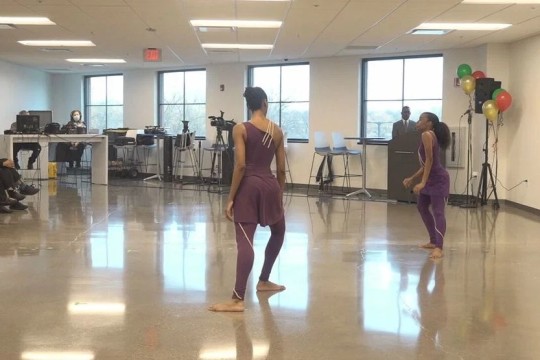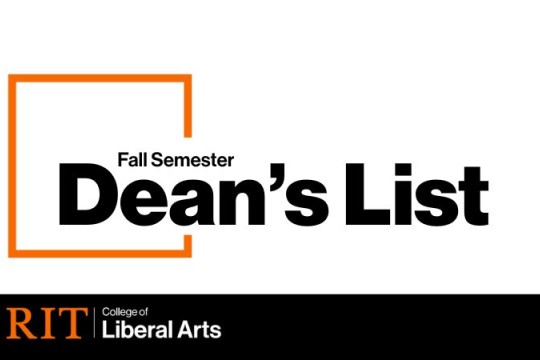School of Communication

School of
Communication
- RIT/
- College of Liberal Arts/
- Academics/
- Academic Departments/
- School of Communication
Subscribe to School of Communication Emails
Follow us
Overview
The School of Communication’s degree programs, minors, and immersions emphasize applied theory and practical knowledge that build the communication skills necessary to succeed in a variety of industries. Coursework leverages strengths from across the university to develop proficiency in technical or professional areas such as design, photography, marketing, healthcare, or technology and creates interdisciplinary opportunities to practice these skill sets inside and out of the classroom. Our faculty are dedicated to exceptional teaching and providing individual attention to students. The school maintains a small feel, with a strong sense of community and a commitment to student mentorship.
3
Degree programs
Advertising and Public Relations BS, Communication BS (with journalism option), and Communication MS
7
Minors offered
Advertising and public relations, American arts, communication, film studies, journalism, health communication, and visual culture
6
Immersions offered
Advertising and public relations, American arts, communication, film studies, journalism, and visual culture
Latest News
-
February 21, 2026

Town of Brighton hosts Black History Month event
WHAM-TV interviews Katrina Overby, assistant professor in the School of Communication, about a celebration for Black History Month hosted by Brighton, N.Y.
-
February 10, 2026

RIT College of Liberal Arts Announces Dean’s List for the Fall 2025 Semester
Three hundred and sixty College of Liberal Arts undergraduate students earned a spot on the fall 2025 semester dean's list, including 74 who are double majors with the college.
-
February 3, 2026

Rebecca J. DeRoo announced as the next William A. Kern Professor in Communications
Rebecca J. DeRoo, newly named the William A. Kern Professor in Communications, aims to increase opportunities for scholarship in visual communication.
Featured Work and Profiles
-
Mentorship Plus Dynamic Curriculum and Experiences Supported Grad's Success
"...My education at RIT uniquely prepared me for this role by blending communication, business thinking, and human-centered leadership—foundations I rely on every day as I help build and advance large...
Read More about Mentorship Plus Dynamic Curriculum and Experiences Supported Grad's Success -
Learning by Doing Led this Grad to Consumer Research Career Path
"[RIT Learning by Doing Experiences] sparked my curiosity and guided me toward professions where I could continue to research and leverage my undergraduate background alongside the research skills...
Read More about Learning by Doing Led this Grad to Consumer Research Career Path -
Four Years and a Full Experience: From career-launching co-ops to clubs and research, this 2025 grad made the most of every moment at RIT
Hailey Fowler began at RIT like so many other first-year college students, slightly shy but super psyched to begin her college journey. At RIT, she soon connected with experiences that gave her an...
Read More about Four Years and a Full Experience: From career-launching co-ops to clubs and research, this 2025 grad made the most of every moment at RIT -
Meet Cassandra Paul, May 2025 AdPR Grad
Experiences in and out of the classroom helped this Advertising and Public Relations major grow as a leader, explore new experiences, and prepare for a career in digital marketing, advertising, and...
Read More about Meet Cassandra Paul, May 2025 AdPR Grad -
Philosophy Grad Makes Positive Impact with a Career in Teaching
“No matter what subject you teach, you are helping the future of our entire nation. The nation may rest in the hands of the future generations, but those future generations are resting on our...
Read More about Philosophy Grad Makes Positive Impact with a Career in Teaching -
RIT Alumna Thrives in Real Estate Law at Prestigious NYC Firm
After passing the New York state bar exam, Shakierah Smith became a real estate associate at Fried, Frank, Harris, Shriver & Jacobson, a law firm in New York known nationally for its...
Read More about RIT Alumna Thrives in Real Estate Law at Prestigious NYC Firm
Undergraduate Programs
Students develop relevant skills through a core of courses focused on the theories of advertising and public relations, communication, or journalism and their application in the real world. A professional core from a different college such as Saunders College of Business or the College of Art and Design develops complementary skill sets in areas such as marketing, photography, or design. Electives and liberal arts courses complete the curriculum.
Create persuasive campaigns and build brands across traditional and digital media—backed by hands-on projects and industry connections.
Learn more about the Advertising and Public Relations BS programExcel in corporate communication, digital media, journalism, advocacy, nonprofit organizations, or advanced graduate studies in the ever-changing media landscape.
Learn more about the Communication BS programIn RIT’s journalism option, you’ll master the skills to successfully interview, investigate, write, edit, report, and publish news and featured stories across a range of digital media.
Learn more about the Journalism Option - Communication BS programGraduate Programs
The master’s program combines focused study in communication with coursework in an applied or professional area such as marketing, health systems administration, information technology, or digital publishing. You’ll be able to analyze of communication problems, develop solutions, and creatively craft messages to target audiences.
Blend research, strategy, and innovation to launch your career in a rapidly evolving communication landscape.
Learn more about the Communication MS programMinors and Immersions
The advertising and public relations immersion provides opportunities for the advanced study of selected areas central to the persuasive arts as they apply to advertising and public relations, as well as education and practice in the writing, speaking, and design skills required of these professions.
Learn more about the Advertising and Public Relations Immersion programThe advertising and public relations minor prepares students to analyze audiences, write advertising copy, prepare press releases, select media, and manage broad-scaled persuasive campaigns. Students are grounded in the basic theories of persuasive communication enabling them to create persuasive messages with a strong emphasis on ethical decision-making.
Learn more about the Advertising and Public Relations Minor programThis immersion provides students with the opportunity to study the American arts through a variety of disciplines, including painting, architecture, film, photography, music, theatre, and mass media. Each course presents American art within the context of the broader current of American life, including its history, philosophy, social, and cultural traditions.
Learn more about the American Arts Immersion programThis minor provides students with an opportunity to study the American arts in a variety of disciplines, including painting, architecture, film, photography, music, theatre, and the mass media. Courses present American art within the context of the broader current of American life, including its history, philosophy, social, and cultural traditions.
Learn more about the American Arts Minor programEmployers show a preference for effective communicators with strong analytic or logical reasoning skills. An immersion in analytic and expressive communication provides you with the opportunity to develop both oral and written communication abilities grounded in reasoned argument, which in turn contributes to your individual confidence and empathetic thinking. Courses in this immersion may rely in part upon great or transformative texts selected for their relevance for learning rhetoric, argument, critical thinking, and/or ethics, and have the option to incorporate activities in RIT’s Expressive Communication Center.
Learn more about the Analytic and Expressive Communication Immersion programAdvanced study of selected areas of communication, including an overview of the fields of persuasion, mass communications, public speaking, and small group communication. Students will understand and apply several modes of communication in academic, professional, and personal situations.
Learn more about the Communication Immersion programStudents gain a foundation in human communication theories, research, and skills. Students select courses in mass media analysis, communication in professional and organizational contexts, communication skills, and critical reflection of and on communication in society.
Learn more about the Communication Minor programThe film studies immersion allows students to engage in the study of global cinema using a variety of interdisciplinary methodologies and perspectives. Coming from the disciplines of English, anthropology, philosophy, fine arts/visual culture, political science, history, and modern languages, the immersion investigates cinema’s mass appeal as a form of entertainment, but also the power it wields as a disseminator of ideas, history, values, aesthetics, behavior, and cultural norms.
Learn more about the Film Studies Immersion programFilm studies explores the role of cinema in our contemporary global culture. Using methodologies and perspectives from a variety of disciplines, such as English, anthropology, philosophy, fine arts/visual culture, political science, history, and modern languages, the film studies minor investigates cinema’s mass appeal as a form of entertainment, but also the power it wields as a disseminator of ideas, history, values, aesthetics, behavior, and cultural norms.
Learn more about the Film Studies Minor programThe health communication minor provides students with theoretical and applied knowledge about communication’s role in health care delivery, doctor-patient communication, health campaigns and public health, and other areas related to the dissemination of health information. This collaborative minor is designed for students interested in health care fields or health and risk communication.
Learn more about the Health Communication Minor programThe journalism immersion provides opportunities for the advanced study of selected areas of journalism, including its history and relevant legal and ethical issues, and for education and practice in writing and editing skills required of journalists.
Learn more about the Journalism Immersion programThe journalism minor provides students with a foundation in the professional study and practice of journalism. Courses offer a broad perspective that includes historical, legal, and ethical issues of specific concern to journalism, as well as learning and practice writing in a journalistic style for delivery across multiple media platforms.
Learn more about the Journalism Minor programVisual culture explores the role of visual media in everyday life and its critical function in the dissemination of ideas in the public sphere. Emphasizing comparative critical approaches to the convergence of art, popular media, science, and technology, the immersion engages globalized visual media ranging from photography, television, film, new media (the web, digital imaging, and social networks), architecture, design, and art (painting, sculpture, and multimedia forms) in the context of such social arenas as art, news, science, advertising, and popular culture. The goal is to help students develop media literacy.
Learn more about the Visual Culture Immersion programVisual culture explores the role of visual media in everyday life and its critical function in the dissemination of ideas in the public sphere. Emphasizing comparative critical approaches to the convergence of art, popular media, science, and technology, the minor engages globalized visual media ranging from photography, television and film, to new media (the web, digital imaging, and social networks), architecture, design, and art (painting, sculpture, and multimedia forms) in the context of such social arenas, as art, news, science, advertising, and popular culture.
Learn more about the Visual Culture Minor programAnnual Student Research in Communication Conference
The RIT School of Communication hosts graduate, undergraduate, and high school students from across New York state and beyond to share their research in communication and related disciplines during our Student Research in Communication Conference. Research paper submissions on any topic within the communication field and related disciplines (including advertising, public relations, media studies, film studies, journalism, and others) are invited. Read about our most recent conference, how to submit papers, and deadlines for submitting >














